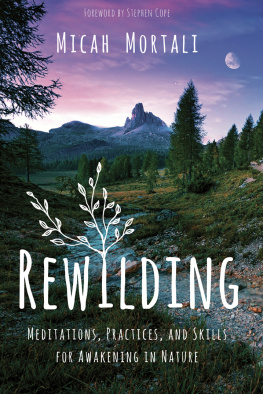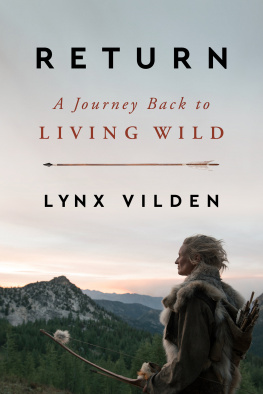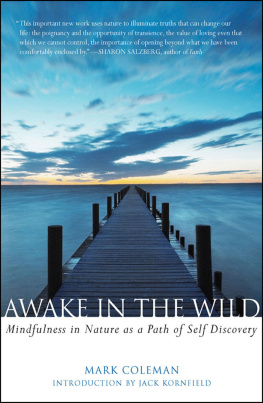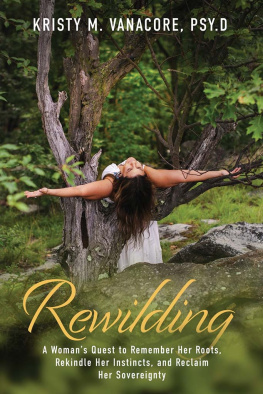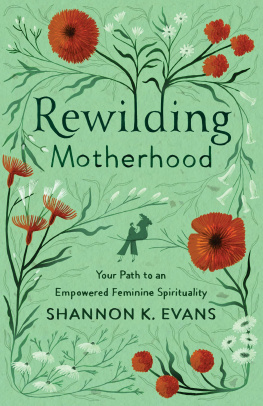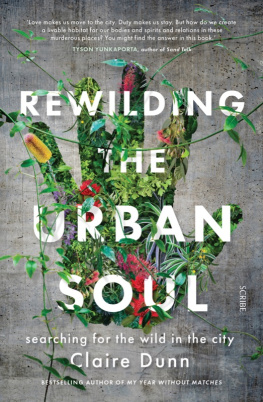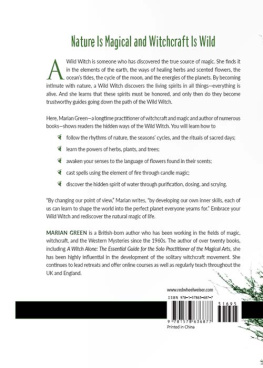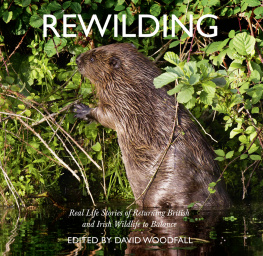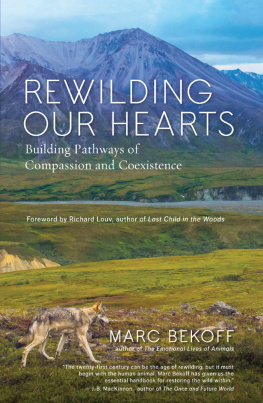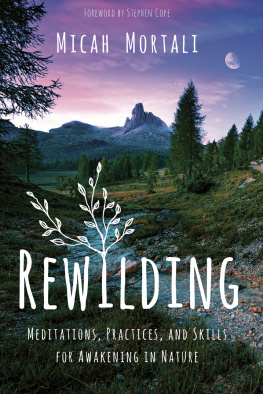
Sounds True
Boulder, CO 80306
2019 Micah Mortali
Foreword 2019 Stephen Cope
Sounds True is a trademark of Sounds True, Inc.
All rights reserved. No part of this book may be used or reproduced in any manner without written permission from the author and publisher.
This book is not intended as a substitute for the medical recommendations of physicians, mental health professionals, or other health-care providers. Rather, it is intended to offer information to help the reader cooperate with physicians, mental health professionals, and health-care providers in a mutual quest for optimal well-being. We advise readers to carefully review and understand the ideas presented and to seek the advice of a qualified professional before attempting to use them.
Published 2019
Cover design by Jennifer Miles
Book design by Beth Skelley
Illustrations 2019 Meredith March
Printed in Canada
Library of Congress Cataloging-in-Publication Data
Names: Mortali, Micah, author.
Title: Rewilding : meditations, practices, and skills for awakening in nature / Micah Mortali ; foreword by Stephen Cope.
Description: Boulder, CO : Sounds True, [2019] | Includes bibliographical references and index.
Identifiers: LCCN 2019010436 (print) | LCCN 2019012781 (ebook) | ISBN 9781683644224 (ebook) | ISBN 9781683643258 (pbk.)
Subjects: LCSH: Nature--Psychological aspects. | NatureReligious aspects. | Nature observation. | Mindfulness (Psychology)
Classification: LCC BF353.5.N37 (ebook) | LCC BF353.5.N37 M67 2019 (print) | DDC 155.9/1 dc23
LC record available at https://lccn.loc.gov/2019010436
This book is dedicated to Solia, Stryder, Cora, and the children of 2229: our seventh generation. Each generation has its seventh generation to look out for. They are ours.
In gratitude to the Haudenosaunee Confederacy for the wisdom to think of those yet to come when making decisions.
Special thanks to my parents, who helped to awaken and nurture my relationship with the earth.

DEEP ROOTS ARE NOT REACHED BY THE FROST.
J. R. R. TOLKIEN
CONTENTS
Practice:
Practices:
Practices:
Practices:
Practice:
Practices:
FOREWORD
During the fall and winter of 1850 and 1851, Henry David Thoreau, Americas great philosopher and naturalist, was deeply immersed in an investigation of his growing experience of what he would call The Wild. He had come to believe that the very energy and genius of humankind was to be found only in a deep, mystical connection with our own inner wildness. Life consists with wildness, he wrote in his oft-delivered lecture entitled The Wild, first given live to an audience in 1851. The most alive is the wildest.... All good things are wild and free.
But what is this wildness that Thoreau seeks out and longs for? Do we long for it as well? You have in your hands a book entitled Rewilding. Does this mean that you feel, as Thoreau did, some lack of wildness in your life?
Keep in mind that Thoreau was a profoundly civilized man. Only a decade before his great affair with wildness, he had graduated from Harvard University a place we might think of as decidedly unwild where he excelled in Latin and Greek, in the study of the classics, in philosophy and ancient history, and a multitude of modern languages. He was devoted to knowledge. To the highest in Western civilization. To the wisdom of the great human cultures.
But had he somehow in his vast educational journey missed a connection with his inner ape?
Yes, he had. By his midthirties, Thoreau had come to believe that the journey to the highest pinnacle of human knowledge must lead beyond all of the book learning he had mastered. It must lead inexorably to a deep reacquaintance with the natural world from which we spring. In midlife, he fairly explodes with rapture in his discovery of the sublime in nature. His writing pulsates with these discoveries. In what he calls his newer testament, he calls for a great awakening to nature to The Wild. He sings out his credo: I believe in the forest, and in the meadow, and in the night in which the corn grows.
Can we identify with Thoreau in his search for the missing parts of human experience? Yes, of course we can. It is useful for us to remember that by the mid-1850s, visionaries such as Thoreau were already perceiving a profound deficit in our modern ways of living were already seeing how we had lost our connection with the natural world. Their proclamations were, of course, an early identification of what we now call nature deficit disorder.
But Thoreau anticipated us in more ways than this. In addition to being one of our greatest naturalists, he was, famously, one of the first American proponents of the study of Eastern religion, and, perhaps especially, of the yoga tradition. Indeed, the great yogic scripture called the Bhagavad Gita was one of the few books Thoreau always had at his side during his two-year pilgrimage at Walden Pond. Even I, he wrote, as he sat on the edge of the pond at first morning light, am a yogi!
Thoreaus journey to Walden Pond was an outward and visible sign of his return to his deepest self, and he associated this journey home with his study of the Eastern classics. He identified himself with what yogis call the quest for the fully alive human being, or in Sanskrit, the jivan mukti. He would certainly have known that one of the very highest stages in the development of the fully alive human being is the recognition that all living beings are made of the same stuff. (That is exactly how the yoga scriptures word it: the same stuff.) He would have known that all of those beings in the forest and the meadow and the cornfield were made of exactly the same stuff from which he was made. He would have understood that in knowing them, he knew himself more deeply. He would have seen himself as part of the family of nature.
In this brilliant new book, Micah Mortali stands on the shoulders of Thoreau in so many ways, bringing our quest for wildness into the twenty-first century. He acknowledges our longing for this lost part of our oh-so-civilized selves. And then more: he gives us simple, useful, and elegant practices through which we can reclaim this lost part.
In Thoreau, every exterior journey the journey into the meadow and the forest and the cornfield is also a journey into the beautiful internal world of the human mind, the human imagination, the human soul. What is outside is inside. And what is inside is outside. And the highest stage of this homecoming in the yoga tradition is called samadhi, which literally means bringing the world together.
Micah Mortali writes in the highest tradition of both Thoreau and yoga, from which he himself springs. His book, indeed, brings the world together. The interior and the exterior. The civilized and the uncivilized. The human and the more-than-human. We are grateful for this wonderful effort.
Stephen Cope
Scholar Emeritus
Kripalu Center for Yoga & Health
INTRODUCTION
Rewilding is a coming home to our roots. It is a recognition that this planet and our local environments are priceless gifts from the forces of life in our universe. To rewild is to reach out and embrace the earth. The concept of wildness, like Tarzan, is the invention of a society at odds with nature. Rewilding is a return to our essential nature. It is an attempt to reclaim something of what we were before we used words like civilized to define ourselves.
Next page
